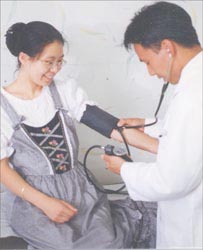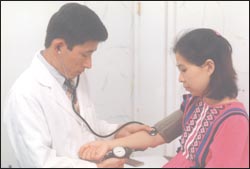
- 임신 분만 중 임신부나 태아에게 어떤 병이 있어 고 위험성 임신이라고 판단될 때,
- 태아에게나 갓 태어난 아기에게 어떤 병이 생겨 그 병으로 태아나 신생아에게 건강문제가 크게 생길 가능성이 있을 때,
- 임신부에게 있는 어떤 유전병으로 태아나 태어난 후 아기의 건강과 생명에 위험성이 생길 수 있다고 판단될 때,
- 그 외 임신부나 태아에게 어떤 건강문제가 있거나 생길 가능성이 있어 고 위험성 임신이라고 판단될

Medical practitioners who can take care of pregnancy, delivery, postpartum recovery 임신 분만 산후 회복을 돌봐줄 수 있는 의료인들
- Most of the normal or abnormal problems that may occur during pregnancy, delivery, or postpartum recovery. We can solve it appropriately on the fly, It can help you to deliver the safest pregnancy, It can help you to give birth in the most comfortable way, mentally and physically, It can help the fertilized egg, embryo, and fetus to grow and develop normally and to be born into a healthy baby.
- The following explains about doctors, nurses, midwives, etc. who can provide the best health care during pregnancy, delivery, and postpartum recovery. If you are surely diagnosed as pregnant, you must study especially about pregnancy, delivery, the health of the pregnant woman, postpartum recovery, and the fetus, and seek help from a specialized obstetrician or another medical professional.
- After being diagnosed as pregnant, the first thing a pregnant woman should do is to seek an obstetrician who can assist with full-time postpartum recovery of pregnancy.
- Depending on the province where you live, you can get the help of other medical personnel instead of getting the help of an obstetrician, depending on various circumstances.
- You should also find out how much medical expenses it will cost to get help from healthcare providers to help you recover from pregnancy, delivery, and postpartum, and you should also choose a pediatrician who will take care of your baby before the baby is born.
- Medical professionals who can help with pregnancy, childbirth, and postpartum recovery, as well as those who can help with health problems of babies, will be described in detail below.
1. The obstetrician-gynecologist / OB-GYN
An obstetrician-gynecologist is a specialist who specializes in ovaries, fallopian tubes, uterus, vaginal, vulva, and other women’s internal and external genital anatomy, menstruation, genital-related diseases and health problems, pregnancy, delivery and postpartum health problems. do.
An obstetrician who specializes mainly in pregnancy, delivery and postpartum health problems is called an obstetrician. A specialist who specializes mainly in diseases and health problems related to women’s internal and external genital organs is called a gynecologist.
As described above, obstetricians and gynecologists can be clearly distinguished, but specialists who specialize only in obstetrics or gynecology are rare.
There are usually more obstetrics and gynecologists (obstetricians) who specialize in obstetrics and gynecology.
For one reason or another, it is common to seek the help of a gynecologist mainly for pregnancy, childbirth, and postpartum recovery.
2. Perinatologist

Obstetrician
Obstetrician medicine that deals specifically with diseases that can occur to the fetus during delivery, growth and development of the fetus, and health problems of the fetus related to the pregnant woman and the fetus is called perinatologist, and perinatologist is a specialist who mainly studies and specializes in perinatal biology.
It is called a perinatal specialist. Perinatal specialists are not so common specialists.
His specialty and research fields are not well known not only to the general public but also to medical professionals. The research fields and specialties of perinatal specialists may be somewhat different for each perinatal specialist.
- It further explains the scope of the general specialty of perinatal specialists.
2. Pregnancy When a pregnant woman or fetus is diagnosed with a high-risk pregnancy due to
some disease during delivery,
3. When a disease occurs in the fetus or in a newborn baby, and there is a possibility that the
disease may cause serious health problems in the fetus or newborn,
4. When it is determined that any genetic disease in a pregnant woman may pose a risk to the
health and life of the fetus or the baby after birth, In addition, the pregnant woman or fetus may
have or may have some health problems, so it is considered a high-risk pregnancy.
It is common to seek help from a perinatal specialist.
- For reference, after specializing in obstetrics, you become a perinatologist (perinatal specialist) after specializing in perinatal biology.
- When pregnant women under the age of 18 years or over 35 years of age are pregnant, pregnant women between the ages of 18 and 35 are more likely to have health problems for pregnant women, fetuses, and newborn babies than during pregnancy.
- There may be more other problems related to pregnancy and delivery, and those problems may be more complex. For this reason, it is better to treat the pregnancy as a high-risk pregnancy and seek the help of a perinatal specialist when women before 18 years of age become pregnant, or when women older than 35 are pregnant.
- When a woman with diabetes, sexually transmitted diseases, high blood pressure, genetic diseases, heart disease, etc. is pregnant,
- Before pregnancy, delivery, or during postpartum recovery, the fetus or newborn baby had any health problems
- The pregnant woman had complications during pregnancy, delivery, postpartum recovery, or Have had a recurrent miscarriage, or During pregnancy, when the fetus or pregnant woman has any health problems and is in a so-called high-risk pregnancy.
- In other cases, the health care of the pregnant woman during pregnancy, the health of the fetus, and the health of the newborn baby after delivery can be specially taken by a perinatologist. In addition, it prevents such health problems from occurring in pregnant women or fetuses, and if necessary, fetal ultrasound, amniotic fluid test, and chorionic villi are collected to perform necessary tests.
3. Family practitioner at home

Some family doctors take care of pregnant women’s health
- Regardless of the age or sex of the patient, a family doctor is a specialist who has studied and studied the health problems of family members-grandfather, grandmother, father, mother, and children regardless of age and gender.
- Most family doctors prevent health problems related to normal pregnancy, delivery, and postpartum recovery, diagnose and treat any disease, and prevent only relatively minor problems among women’s internal and external genital diseases and health problems.
- It is common to diagnose and treat. If complex pregnancy complications or health problems arise during pregnancy, delivery, or postpartum recovery, and the family doctor cannot solve such problems by himself, either have a gynecologist or other appropriate specialist for the consultation or have him or her perform the entire preventive diagnosis treatment.
- It is common to treat them together, either by referral or by consulting with other specialists.
4. General practitioner
- Regardless of age and gender, various diseases are prevented, diagnosed, treated, and especially researched on each type of health problem.
- Although not specialized, it is comparatively among diseases and health problems belonging to various medical departments such as internal science, pediatrics, obstetrics, gynecology and surgery. Doctors who can prevent, diagnose and treat simple diseases and health problems are called general practitioners.
- General practitioners are not so common these days.
5. Midwife
- Nurses specializing in pregnancy, delivery, postpartum recovery, and health problems and diseases of newborn babies are called midwives.
- Midwives generally work with obstetricians to prevent and diagnose health problems related to normal pregnancy, delivery and postpartum recovery.
- The scope and limitations of medical treatment that midwives can do are different according to the medical laws of each country.
- Most midwives can prevent and diagnose and treat normal health problems or simple gynecological diseases and complications of pregnancy caused by childbirth during pregnancy from early pregnancy to postpartum recovery.
- However, if a pregnant woman develops a serious illness, complicated pregnancy complications, or postpartum health problems during pregnancy, delivery, or postpartum recovery, or if a baby has any health problems, refer to a gynecologist or other appropriate specialist and ask the specialist for the disease or health. It is common to treat the problem with preventive diagnosis.
6. Resident
- Doctors who are majoring in a certain course of medicine at a medical school, completing and graduating from the course, completing an internship course, studying the medical starch field in a hospital, and being trained are collectively called a resident, majoring in obstetrics and gynecology, and studying in that field.
- Resident doctors who are trained in remission specialists are called obstetrics and gynecology residents. It is common for obstetrics and gynecology residents to perform medical treatments related to pregnancy, delivery, and postpartum recovery according to the instructions of the homeroom gynecologist according to hospital rules.
7. Anesthesiologist
- A doctor who studies anesthesia and specializes in anesthesia is called an anesthesiologist. Anesthesiologists are specialists who provide treatment to relieve pain during delivery and help a gynecologist to safely deliver a cesarean section by properly anesthetizing the pregnant woman when delivering a cesarean section.
- When there is severe bleeding during delivery, important symptoms necessary to maintain basic life can be monitored with a monitor, and the obstetrician can participate in the treatment of the patient with the help of a gynecologist, and when necessary, measures to secure the airway so that the delivery department can breathe normally. do.
8. In addition, medical professionals such as nurses, X-ray testers, blood collectors, ultrasound testers, physical therapists, and social workers can help with pregnancy, delivery and postpartum recovery.
Appoint a doctor to take care of your pregnancy, delivery, etc.
- After receiving confirmation that you are pregnant, you should soon appoint a gynecologist, midwife, or another specialist who can take care of pregnancy, delivery, postpartum recovery, etc.
- Sometimes, you may continue to seek help from a family doctor who has helped you. If your family doctor can’t help you, you can get a referral and get a gynecologist.
- When deciding which doctor will take care of your pregnancy, delivery, etc., it is better to have a gynecologist who works in a hospital near your home as much as possible.
- When deciding a doctor or midwife, you can ask a public health center, medical association, or a teacher who teaches pregnancy and childbirth to choose a gynecologist or midwife you like.
- You can also ask a friend, senior, or neighbor to find a gynecologist.
- After appointing a gynecologist or midwife, the name of the hospital where the doctor or midwife can hospitalize the pregnant woman during delivery, the policy to help pregnant women during postpartum recovery during pregnancy, delivery, and medical expenses associated with it.
- You should know how much this is as soon as possible. A pediatrician